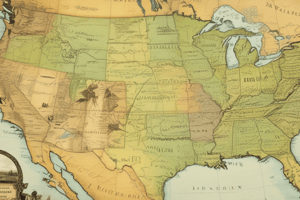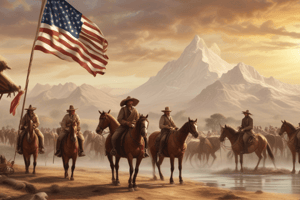Podcast
Questions and Answers
Which event was directly influenced by the concept of Manifest Destiny?
Which event was directly influenced by the concept of Manifest Destiny?
- The Nullification Crisis
- The Missouri Compromise
- The War of 1812
- The Oregon Trail (correct)
What legislation aimed to address the tensions surrounding the extension of slavery into new territories?
What legislation aimed to address the tensions surrounding the extension of slavery into new territories?
- The Kansas-Nebraska Act (correct)
- The Tariff Compromise
- The Wilmot Proviso
- The Morrill Act
Which Supreme Court case ruled that enslaved individuals were not citizens and had no standing to sue?
Which Supreme Court case ruled that enslaved individuals were not citizens and had no standing to sue?
- McCulloch v. Maryland
- Gibbons v. Ogden
- Worcester v. Georgia
- Dred Scott v. Sanford (correct)
Which of the following was a major outcome of the Federal government's approach during the Jacksonian Era?
Which of the following was a major outcome of the Federal government's approach during the Jacksonian Era?
Which key figure is associated with the design and construction of the first successful steamboat?
Which key figure is associated with the design and construction of the first successful steamboat?
Flashcards
American System
American System
A plan by Henry Clay aimed at promoting American economic growth by protecting domestic industries through tariffs, improving infrastructure through road and canal construction, and strengthening the national bank.
Monroe Doctrine
Monroe Doctrine
A policy declared by President James Monroe in 1823, stating that the United States would oppose any European intervention in the Americas and would not interfere in European affairs.
Market Revolution
Market Revolution
A period of rapid economic growth and transformation in the United States from the late 18th to the mid-19th centuries, marked by the development of factories, improved transportation systems, and the rise of a national market economy.
Jacksonian Democracy
Jacksonian Democracy
Signup and view all the flashcards
Manifest Destiny
Manifest Destiny
Signup and view all the flashcards
Study Notes
Era of Good Feelings/Market Revolution
- American System: A plan for economic growth proposed by Henry Clay, focusing on a national bank, protective tariffs, and internal improvements.
- Henry Clay: Key figure in the American System, advocating for national unity and economic development.
- James Monroe: President during the Era of Good Feelings, promoting national unity and foreign policy initiatives.
- John Quincy Adams: Sixth President of the US and important figure in the era, notably related to foreign policy.
- Anglo-American Accords: Agreements with Britain addressing boundary disputes and other issues.
- Monroe Doctrine: Foreign policy statement declaring the Americas off-limits to European colonization.
- Missouri Compromise: Negotiation settling the issue of slavery's expansion into new territories.
- Infrastructure: Improvements in transportation and communication, such as roads and canals.
- Erie Canal: Crucial waterway connecting the Great Lakes to the Atlantic Ocean, bolstering trade and settlement.
- National Road: Major east-west highway, facilitating westward expansion and trade connections.
- The Talmadge Amendment: Proposed amendment that sought to limit the expansion of slavery, leading to debate.
- Second Great Awakening: Religious revival emphasizing personal conversion and social reform.
- The Lowell Mills: Early American textile mills that employed mainly women and girls, shaping work patterns.
- Robert Fulton: Inventor who developed the steamboat, revolutionizing transportation.
- Eli Whitney: Inventor of the cotton gin, significantly impacting agricultural production in the South.
- Cotton Gin: Machine separating cotton seeds from fibers, greatly increasing cotton production and its importance to the South's economy.
- Market Revolution: Transformation in the American economy, moving from a subsistence economy to a market-based system.
Jacksonian Era
- Nullification Crisis: Political conflict over states' rights and the federal government's authority.
- Force Bill: Federal law authorizing the use of military force to enforce federal laws, often involving disputes with state governments.
- Trail of Tears: Forced removal of Native American tribes from their ancestral lands, marked by hardship and loss of life.
- John Marshall: Chief Justice of the Supreme Court, shaping legal interpretations and impacting Federalism.
- Jacksonian Democracy: Political movement expanding suffrage and emphasizing popular sovereignty.
- John C. Calhoun: Key political figure, advocating for states' rights and arguing for federalism.
- The Bank War: Political struggle over the national bank, highlighting conflict between the executive and legislative branches of government.
- Whigs: Political party opposing Jacksonian Democrats, advocating for a stronger federal role in the economy.
- Democrats: Political party generally supporting Jacksonian policies, favoring the common man and limited government intervention.
- Worcester v. Georgia: Supreme Court case affirming Native American sovereignty but ultimately ineffective due to the lacking enforcement.
- Tariff Compromise: Agreement to lessen tariffs as a way to reduce conflict and tensions between federal and state policies.
Manifest Destiny
- James K. Polk: US President instrumental in westward expansion, particularly to the west coast.
- The Oregon Trail: Major route for westward migration, enabling movement across the American continent.
- Mormon exodus: Migration of Mormons westward, driven by religious persecution and seeking new settlements.
- Zachary Taylor: US President that played a role in acquiring and settling part of the west.
- Mexican Cession: Acquisition of territory from Mexico after the Mexican-American War.
- Treaty of Guadalupe Hidalgo: Treaty ending the Mexican-American War and defining borders between Mexico and the US.
- 54-40 or Fight: Slogan referring to the US territory claim on land disputes.
- The Alamo: Significant military battle in the Texas Revolution, remembered as a heroic stand against Mexican forces.
- Manifest Destiny: Belief in the US's divinely ordained right to expand across the North American continent.
- John O'Sullivan: Journalist who coined the term "Manifest Destiny," championing westward expansion.
- Henry David Thoreau: Transcendentalist author, emphasizing individualism and civil disobedience.
- On Civil Disobedience: Thoreau's essay advocating for passive resistance against unjust laws.
- Transcendentalism: Philosophical movement emphasizing intuition, self-reliance, and nature.
- Grimké Sisters: Advocates for women's rights and abolition of slavery.
- Elizabeth Cady Stanton: Leader in the women's rights movement, organizer of the Seneca Falls Convention.
- Seneca Falls Convention: Landmark meeting advocating for women's suffrage and equality.
- Declaration of Sentiments: Document at the Seneca Falls Convention, outlining women's grievances and demands.
Sectionalism
- Wilmot Proviso: Proposed measure aiming to prohibit slavery in territories acquired from Mexico.
- Dred Scott v. Sanford: Landmark Supreme Court ruling denying citizenship to enslaved people and impacting the legality of abolition.
- William Lloyd Garrison: Abolitionist leader, influential in the campaign to end slavery.
- The Liberator: Abolitionist newspaper, strongly advocating for the immediate end of slavery.
- The American Anti-Slavery Society: Organization advocating for the immediate abolition of slavery.
- Compromise of 1850: Set of laws attempting to settle slavery disputes, but ultimately failing to prevent further conflict.
- Kansas-Nebraska Act: Legislation allowing popular sovereignty in Kansas and Nebraska regarding slavery, increasing tensions over its expansion.
- Fugitive Slave Law: Part of the Compromise of 1850, enforcing the return of runaway enslaved people.
- Bleeding Kansas: Violent conflict over the issue of slavery in Kansas, reflecting the breakdown of compromises.
- John Brown: Abolitionist who advocated for using violence to end slavery.
- Brooks and Sumner Incident: Assault in the Senate highlighting heightened sectional tensions.
- Harriet Beecher Stowe: Author of Uncle Tom's Cabin, influential in raising awareness of the horrors of slavery.
- Popular Sovereignty: Doctrine that the people of a territory or state determine the issue of slavery.
- Frederick Douglass: Former enslaved person and prominent abolitionist, advocating for equality.
- William Seward: Key political figure and important voice on sectionalism, supporting antislavery and a unified nation.
- Lincoln-Douglas Debates: Series of debates between Lincoln and Douglas highlighting their views on slavery.
- Quantrill: Civil War partisan leader, known for his violence and brutality.
- Free Soil Party: Political party opposing the expansion of slavery into new territories.
- Gradualism: Approach advocating for a phased approach to ending slavery, usually over a set period.
- Abolitionism: Movement advocating for the immediate and complete abolition of slavery.
- Uncle Tom's Cabin: Anti-slavery novel by Harriet Beecher Stowe, contributing to public sentiment's shift against slavery.
Civil War
- Fort Sumter: Site of the first shots of the Civil War.
- Battle of Gettysburg: Crucial Union victory marking a turning point in the Civil War.
- The 54th Massachusetts: Famous African American regiment in the Union Army during the Civil War.
- Jefferson Davis: President of the Confederate States of America.
- Sherman's March to the Sea: Union military campaign to destroy infrastructure and morale in the South.
- U.S. Grant: Union General, ultimately leading his army to victory against the Confederacy.
- Battle of Vicksburg: Decisive Union victory gaining control of the Mississippi River during the Civil War.
- Robert E. Lee: Confederate General, leading the Confederate army during crucial battles of the Civil War.
- Appomattox Court House: Site of Lee's surrender to Grant, marking the end of the Civil War.
- Gettysburg Address: Lincoln's famous speech commemorating the fallen soldiers at Gettysburg.
- John Wilkes Booth: Assassin of Abraham Lincoln.
- Abraham Lincoln: President of the United States during the Civil War.
- Anaconda Plan: Union strategy to defeat the Confederacy by blockading ports and controlling the river system.
Studying That Suits You
Use AI to generate personalized quizzes and flashcards to suit your learning preferences.
Description
Dive into the Era of Good Feelings and the Market Revolution with this quiz! Explore key figures like Henry Clay and James Monroe, critical policies such as the American System, and landmark decisions like the Missouri Compromise. Test your knowledge on the pivotal developments that shaped early 19th century America.




